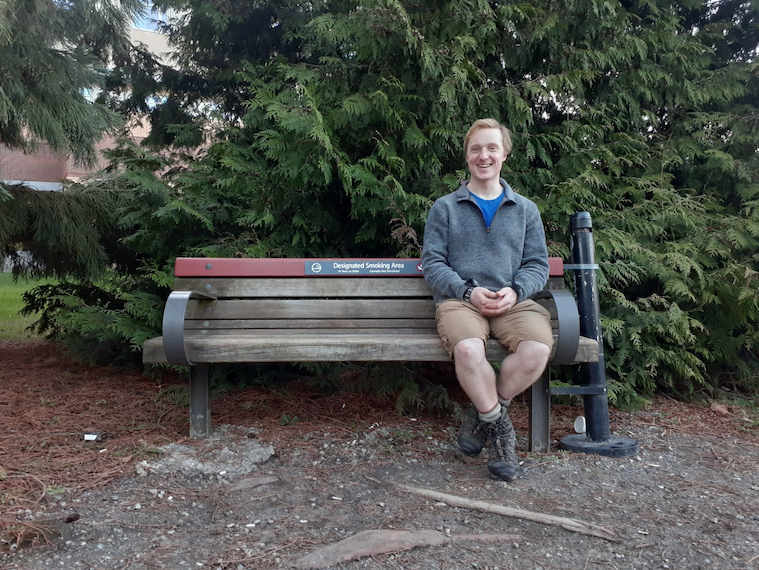
Ever notice that for a non-smoking campus, UVic has a lot of cigarette litter?
While there are a few designated smoking benches outside of Ring Road, the inside of the Ring is plastered with signs claiming that the area is smoke-free. Technically, however, the smoking policy is voluntary and there are several “unofficial” smoking sites around the inner campus.
But, being unofficial, these sites don’t have any ashtrays, so instead of being properly disposed of, cigarette butts end up on the ground. Clearly UVic’s smoke-free program is not working as intended, and Walker Tottman is trying to find out why.
Tottman, a fourth-year anthropology and environmental studies student, is working to quantify cigarette pollution on campus.
“This is a global phenomenon that happens at ridiculous amounts. Two thirds … of cigarettes smoked are estimated to be improperly discarded and they are toxic, non-compostable, non-biodegradable products,” said Tottman.
Ultimately, Tottman wants to understand the behaviours that lead to improper cigarette butt discards, and what kinds of solutions or responses can be applied.
“I’m hoping to derive some sort of implementation plan that might help reduce [littering on campus].”
On a larger scale, though, Tottman wants his project to address how we interact with the world around us. If his results can identify the cause of improper cigarette butt discards, then maybe they’ll be able to change broader environmental attitudes as well.
Tottman’s first foray into independent research was through UVic’s coastal archaeological field school in Barkley Sound. After he got back, he used the honours program as an opportunity to pursue his own interests in sustainability and environmental justice.
What got you interested in this type of research?
I figured … that there’s got to be some sort of a deeper significance to the fact that cigarette butts are so prominent. They’re deliberate discard events and the amount of those discard events is mind-boggling. It’s expressing the relationship that people have with the environment, because it is an interaction with the environment. Coming at it from an ecological conservation [standpoint], it really strikes me as quite stark.
Why do you think this project is important?
I think we are in a position where it’s important to consider our relationship with the world around us, with other non-human beings and the natural environment. To me, these cigarette butts are [a] very specific example of an environmental interaction. Beyond just this expression of the relationship, or within this relationship that we’re expressing, is the way we consider a resource. To look at a very particular activity, and to look at how much of a given resource [it utilizes], is telling of some sort of … opinion on what that resource is worth.
Did you plan on doing the honours program?
No, I think I saw a poster for the honours and I [thought] “hmm that looks like something, but I’d like to graduate soon so maybe I won’t do that.” Then I started feeling this from a lot of the classes I’ve taken where your studies are less application-based and I was like “I’d really like to do something.” Beyond just reviewing something that somebody else has already reviewed. I wanted to create something new.
What do you like about doing research?
I think having an interest in what I’m actually researching has been good. It’s also just really fascinating. You’re trying to learn more about something that hasn’t yet been learned … it’s [a] generation of knowledge. It allows your mind to grapple with some sort of event … and try to make sense of it. It’s a neat little mental puzzle in that regard.
Do you want to continue on to do this kind of stuff in the future?
I’m very much on board with keeping it going. I feel like there’s a lot of potential to make significant changes when people care enough to get involved. I’m reticent to stop being in this knowledge-generating sphere … so further research is how I see myself being able to contribute to the world.
Do you have any advice for undergraduates who want to get involved in research?
[Be] willing to contend with failure. Oftentimes, we’re unwilling to even try something for fear of failure, and therefore we really are inhibiting ourselves from learning and growing and developing. If anyone is interested in research, just [take] a risk to step out into that unknown, whatever it is. For me, it was just applying for the honours program.






